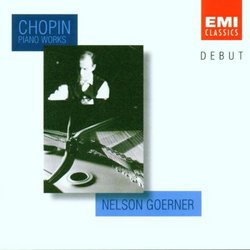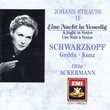| All Artists: Frederic Chopin, Nelson Goerner Title: Chopin: Piano Works Members Wishing: 0 Total Copies: 0 Label: Angel Records Release Date: 10/10/2000 Album Type: Import Genre: Classical Styles: Chamber Music, Forms & Genres, Ballads, Sonatas, Historical Periods, Classical (c.1770-1830), Romantic (c.1820-1910) Number of Discs: 1 SwapaCD Credits: 1 UPC: 724356970120 |
Search - Frederic Chopin, Nelson Goerner :: Chopin: Piano Works
 | Frederic Chopin, Nelson Goerner Chopin: Piano Works Genre: Classical
|
Larger Image |
CD DetailsSimilar CDs
|
CD ReviewsGoerner Has Much To "Say" About How To Interpret Chopin! Raymond Vacchino | Toronto, ON. Canada | 07/30/2008 (5 out of 5 stars) "Argentinian virtuoso Nelson Goerner has much to say when it comes to the question of 'how to interpret Chopin.' The question is one of standing interest, and Goerner has convincingly cut through considerable undergrowth of tradition that took over soon after Chopin's death. Goerner conveys a skillful exploration of Chopin's musical structure throughout his performances on this recording. The Sonata in B minor, is at once perfect for the instrument and taxing for the pianist, yet in the safety of Goerner's virtuosic technique every note is absolutely clear. The opening phrase of the first movement tells us something of what the sonata is about. It is serious and lively, passionate and well defined. Goerner vividly conveys these characteristics with refined fluency, and then carries us into the second theme exemplifying its nocturnal quality with heart-warming sentiment that avoids any sentimentality, something Chopin detested. The playing is tonally sweet and unmannered offering a performance of the first movement that is notable for its passion, tempered energy, and full harmonic flavor. In the 'Scherzo', Goerner superbly integrates its Trio and the playing is well sprung as a result of finger clarity, and a complete understanding of its miniature design. The 'Largo', immediately develops the 'bel canto' line in the opening melody, and beautifully approaches the nocturnes in style. Goerner shapes the movements broad melodic canvas with refined fluency, delicacy and remarkable pedal effects. The 'Finale', is one of the few sonata-rondo's in musical history, and Goerner takes on its galloping character with a strong feeling for the rhythm, and an audacious sense of relentless freedom, and dynamic scope. The 'Polonaise-Fantaisie', stands alone as one of Chopin's best balanced Polonaises. Goerner begins with a darkly coloured introduction conveying a haunting sense of character, followed by a sublimely beautiful improvisation that delicately ascends to a slight moment of silence. The rich chromaticism prepare a broad scale of what is to come. Goerner's approach admirably conveys the glowing invention and harmonic audacity. In the following orchestrally conceived passages, Goerner delivers the necessary distinctive timbres, and also finds the right amount of 'pull' and 'give' at the start and end of the various, suddenly arising developments, something which requires the structural art of a Rubenstein or Perlemuter. The 'Nocturne' in C minor, stands out as a work of major significance. Goerner begins the opening phrase with an intimate sound, and sophisticated grading of dynamics. The performance moves on displaying the various themes from a slow march-like character, to bursting double octaves, majestic calm, enhanced cross-rhythms, followed by Goerner's skilfully resolved cadence, bringing to an end one of Chopin's most eloquent and moving works. The fourth 'Scherzo', is perhaps one of the glories of all music, and Goerner embodies his performance of it with an emotion that one can find joy or grief, happiness or despair, as well as an element of caprice, in which it flits from one thing to another. In the passages of running arabesque, Goerner's sparkling fluency makes the music dance through remote keys in a carefree way. The entire performance is consumed by a rare style of brilliance, and an effortless rhythmic vitality that is never forced. In the 'Barcarolle in F sharp minor', Goerner's playing is colored and inflected with an inner-felt distinction like no other I have ever heard! The phrases are exquisitely shaped, and filled with glowing sonority. His rubato, or musical breathing, is always natural and personal; it is as if he has an affinity with the composer. The finale of the recording is the fourth 'Ballade in F minor'. It is without doubt the most beautiful of the four, and Goerner's performance rejoices in the greatest wealth of musical substance. Few performances so effectively combine the sense of the inevitable, with such freshness and unpredictability. Unpopular to begin with, the fourth 'Ballade', has become one of the composer's greatest achievements. Nelson Goerner is indeed a pianist who is fully in touch with the answer to the question on, "How To Interpret Chopin!" Author: Raymond Vacchino M.Mus. Classical Music Critic " An outsanding Chopin interpreter S. Fam | USA | 03/14/2004 (5 out of 5 stars) "After listening to some of Nelson Goerner's performances of Chopin's works (e.g. piano concertos) I can only say that he is one of very few who could interpert the profound meaning of Chopin's music with exceptional efficiency. I have never seen Mr. Goerner but, but his brilliance stands out. Having been involved in teaching, interpretation, and criticism of performances (especially of Chopin's works), I can justly say that Goerner has an excellent understanding of Chopin, with an incredible mastery of his pianistic ideals and language. It is just to say that he at least measured up to Arthur Rubinstein and Krystian Zimerman in the works that I heard him perform. Considering that Chopin is not only about superior technique, but also about understanding of style and musical language, certainly, Goerner has had some interpertations of Chopin that were BETTER than those of Argerich, Ashkenazy, and most definitely Arrau. And by the way, in response to a previous review; 19th century virtuoso piano works are usually memorized, not read in performances, since many of them are practically beyond reading, especially if dynamics, style, and expression are to be mastered." Ignore the Cuckoo Reviewer John Atherton | CINCINNATI, OHIO United States | 12/31/2003 (5 out of 5 stars) "I have never launched a personal attack on a fellow Amazon reviewer, but to ensure that buyers are not warned away from this superb recital, allow me to say that the "Music Fan From Switzerland" is at best an idiot, and at worst someone who has a grudge against Mr. Goerner. I do not know the pianist, but I do know that noted critics -- including those who can be found at his website -- have declared Goerner a major find; that the Gramophone ranked this as among the best of all recent Chopin recordings; and that when Goerner failed to make it into the final round of the Warsaw Chopin competition shortly after this recording was made, an outraged Martha Argerich and Fou Ts'ong arranged for him to give a concert that was received as enthusiastically as so many others since. Speaking for myself, I believe Goerner employs a fluid and all-encompassing technique to achieve performaces of remarkable passion, poetry and balance. At this price, please don't deprive yourself. And let's hope this Swiss, in the future, will remain neutral."
|

 Track Listings (9) - Disc #1
Track Listings (9) - Disc #1![Beethoven: Best Of Beethoven [Australia]](https://nationalbookswap.com/cd//m/06/0406/6150406.jpg)


